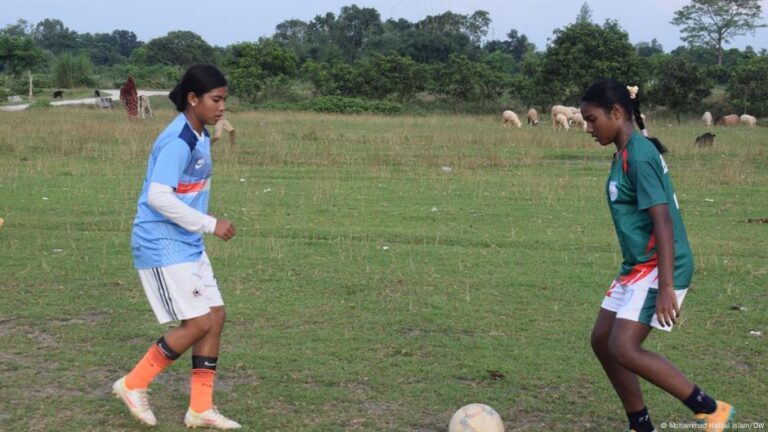For a country of 174 million people, Bangladesh has generally underachieved in the international sporting arena. But now it’s starting to make waves in women’s football.
In July, the senior team qualified for the 2026 Asian Cup for the first time and this month, the under-20 team reached their continental championship, also for the first time.
Playing a part in this success is the Rangatungi United Women’s Football Academy in the remote north of the country, which was founded by one man in 2014. Mohammad Tajul Islam is not a wealthy businessman but a former teacher and farmer with a social conscience.
“Before I started the academy, there was nothing,” he told DW.
“I was a football fan, and I wanted to give opportunities as I could see that women’s football could be powerful in Bangladesh.”
This is starting to happen. The academy had three players in each of the two teams that qualified for the Asian Cups.
“We have sent many players to represent Bangladesh at different age levels,” Tajul Islam said. “We are very proud of all of them.”
Rising star in Bangladesh women’s football
Mosammat Sagorika is one of the best-known players from the academy. The 17-year-old scored four goals for the under-20 team during qualifiers for the Asian Cup and is also an established senior international. The striker is one of the biggest young stars in South Asia and was named the tournament MVP in the regional championship last year when she also finished as top scorer.
“I always had a dream to be a footballer but my parents did not agree due to our social and religious environment,” Sagorika told DW, adding that, in the beginning, her family wanted her to go and get a job and earn money as soon as possible.
For Tajul Islam, the challenge was always persuading usually low-income families that girls could play football.
“The girls were always very interested,” he said. “But I knew that I had to talk to their parents, to show them that playing football could be a good thing for their daughters. Once they gave their support, they gave us big support.”
That is what happened with Sagorika.
“After I joined the academy, my parents told me that if I keep studying, then I can continue those extracurricular activities. Initially, my father did not allow me to play football, but he supported me a lot afterwards and I promised them that I would become a big player one day.”
Breaking down barriers
Once the parents gave their permission, there were still others in the wider community who were unsure about girls playing football or even wearing shorts.
Women’s sport has traditionally not been a priority in the country that gained independence from Pakistan in 1971. In January, Islamist radicals damaged a football pitch in the northwestern town of Joypurhat and prevented two women’s games from going ahead.
“This is a conservative society, and our country is Muslim-orientated, and some people did not agree with women playing football,” Tajul Islam said. “This has been a barrier.”
He felt it was important to get wider backing.
“We went to local politicians, police and administrators and they also supported the academy.”
Being part of a club with other girls from the region made it easier for players.
“I think the academy give us social protection,” Sagorika added. “There is a good coach who teaches us about football, the academy supplies us all with equipment and supports us in developing our physical health and education. The academy is already producing stars of Asian football, and I feel proud of it.”
The challenges
Asian success has also helped change attitudes at home. When Sagorika played against India in 2024, domestic media reported that her fellow villagers, who had originally frowned upon female football, set up a projector to watch the game together and her parents came to the stadium.
“At halftime, someone told me that my father and mother had come and I ran to them. I am very happy that my parents came this far to watch me,” Sagorika, who scored a last-minute goal in the game, said.
“I showed my parents that I can do it.”
Despite the success, keeping the academy going is a challenge with constant financial issues.
“Some people have helped a little, but I have invested all my money,” said Tajul Islam.
“Rangatungi is known around Bangladesh but nobody at a national level has helped me.”
He hopes that with the recent results at a national level, there will be more public and private support to help Bangladesh become a major power in women’s football.
“We need more gym equipment, we need more balls, everything is amateur,” Tajul Isalm said. “We have so many problems, but we have ambition. I do not compromise with any problem; we always try to give the girls everything.”
Central support
Women are starting to earn money in football. The federation has handed more than 30 players contracts with monthly salaries ranging from around €125 to €350 ($146 to $408). Players have also started to move overseas. Ten of the most recent squad play their club football in Bhutan. Getting to the World Cup in Brazil in 2027 – the first to feature 32 teams – would be a dream but qualifying at some point in the next decade is the target.
“Our dedication will take us to our destination, as we are trying our best,” said Sagorika.
“If we get scientific, logistical support then I believe that the women of Bangladesh will play at the World Cup.”
Whenever it happens, Tajul Islam, parents, neighbors and the whole of Bangladesh will be watching.
Edited by: Chuck Penfold


